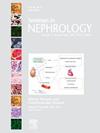Patient-Reported Experience Measures to Evaluate and Improve the Quality of Care in Nephrology
IF 3.5
3区 医学
Q2 UROLOGY & NEPHROLOGY
引用次数: 0
Abstract
Patient experience is considered a pillar of high-quality care, integral to patient-centered care, but despite significant policy focus on patient-reported experience measures (PREMs), little is published regarding their development, use, or impact on clinical practice. In nephrology, PREMs are increasingly used in research to capture and quantify patients’ perceptions of their experiences with health care services. It has been shown that a negative patient experience impacts patients’ physical and psychological health, and a small but significant proportion of patients across a selection of settings report their experiences of health care as poor or suboptimal. Evidence of whether PREMs improve quality of care or support person-centered care in the clinical setting remains largely theoretical. Extensive effort has been invested to develop various PREMs for kidney services. Although little evidence linking PREM collection to meaningful change in delivery of care currently exists, work is underway. Early indications are that with the right facilitators, implementing PREMs in routine practice can help providers recognize where change is needed and galvanize transformation. The journey toward understanding the connection between PREM data and modifiable provider characteristics to target and enable change has started, but further evidence is needed. This article outlines the history of PREMs in nephrology and details their current use alongside implementation challenges. The use and benefits of PREMs are discussed before considering the evidence base for their impact on renal health care. Possible next steps for PREMs are suggested and best practices highlighted.
用于评估和提高肾脏病学医疗质量的 "患者体验报告"。
患者体验被认为是高质量医疗服务的支柱,是以患者为中心的医疗服务不可或缺的一部分,但尽管政策对患者报告的体验测量(PREMs)给予了极大的关注,但关于其开发、使用或对临床实践的影响却鲜有报道。在肾脏病学研究中,PREMs 被越来越多地用于捕捉和量化患者对医疗服务体验的看法。研究表明,负面的患者体验会影响患者的生理和心理健康,在各种医疗机构中,有一小部分患者称他们的医疗体验很差或不尽人意。PREM 是否能在临床环境中提高医疗质量或支持以人为本的医疗服务,这方面的证据在很大程度上仍停留在理论层面。人们已投入大量精力为肾脏服务开发各种 PREM。虽然目前几乎没有证据表明 PREM 的收集与医疗服务的提供发生了有意义的变化,但相关工作正在进行中。早期迹象表明,如果有合适的推动者,在常规实践中实施 PREM 可以帮助医疗服务提供者认识到需要改变的地方,并激发变革。了解 PREM 数据与可修改的医疗服务提供者特征之间的联系,从而有的放矢地促成变革的征程已经开始,但还需要进一步的证据。本文概述了 PREM 在肾脏病学中的历史,并详细介绍了 PREM 目前的使用情况以及实施过程中面临的挑战。在探讨 PREMs 对肾脏医疗保健影响的证据基础之前,还讨论了 PREMs 的使用和益处。文章提出了 PREM 下一步可能采取的措施,并强调了最佳实践。
本文章由计算机程序翻译,如有差异,请以英文原文为准。
求助全文
约1分钟内获得全文
求助全文
来源期刊

Seminars in nephrology
医学-泌尿学与肾脏学
CiteScore
5.60
自引率
0.00%
发文量
27
审稿时长
6-12 weeks
期刊介绍:
Seminars in Nephrology is a timely source for the publication of new concepts and research findings relevant to the clinical practice of nephrology. Each issue is an organized compendium of practical information that serves as a lasting reference for nephrologists, internists and physicians in training.
 求助内容:
求助内容: 应助结果提醒方式:
应助结果提醒方式:


